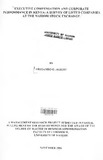| dc.contributor.author | Odhiambo, Albert O | |
| dc.date.accessioned | 2013-05-10T13:17:07Z | |
| dc.date.available | 2013-05-10T13:17:07Z | |
| dc.date.issued | 2006-11 | |
| dc.identifier.uri | http://erepository.uonbi.ac.ke:8080/xmlui/handle/123456789/21458 | |
| dc.description | Master of Business Administration | en |
| dc.description.abstract | Corporations play an important role in the production of goods and services in a
market economy such as Kenya's. The productivity of a corporation depends on
the efforts of its managers. The management on the other hand is an agent and is
under obligation to act in the best interest of the share holders in return for
remuneration. Economic theory suggests that in the absence of constraints, the
managers would act in their own best interest.
There are three basic ways of ensuring corporate goal congruence: monitoring the
activities of managers, tying their wealth closely to that of the shareholders
through stock compensation, and incentive contracting. The first method is
sometimes impeded by corporate information asymmetry and differences
specialization between shareholders and managers.
The objective of this research was to establish the extent to which incentive
contracting is applied amongst listed companies at the Nairobi Stock exchange.
The findings indicate that most listed companies use this method to a limited
extent and predominantly with the chief executive. | en |
| dc.language.iso | en | en |
| dc.title | Executive compensation and corporate performance in Kenya: a survey of listed companies at the Nairobi Stock Exchange | en |
| dc.type | Thesis | en |
| local.publisher | School of Business, University of Nairobi | en |

